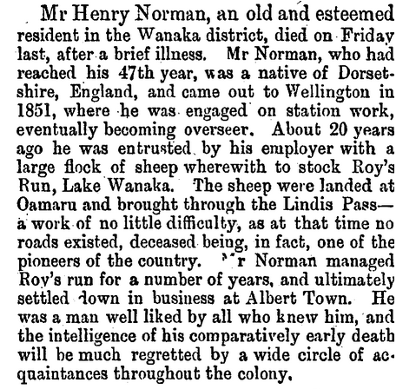The Normans are Coming!
No, nothing to do with Norman the Conqueror and 1066! More importantly to the Upper Clutha, this story is about the first known European family to permanently settle here – Henry Norman, his wife Mary Ann and their son Richard.
Henry was christened as Abel Ferris Dominy in 1833 in Dorset, England. When he was 15, he became an indentured apprentice sailor and may have jumped ship in Wellington in 1851, changing his name to Henry Ferris Norman (his mother’s maiden surname) to avoid detection. Mary Ann Edwards came from Yorkshire in 1849 and married Henry in 1858. Their first child, Richard, was born in 1859 and was initially named Henry Robert Norman.
In 1859/60, Henry was employed by John Roy to manage what we know as Roys Station here in the Upper Clutha. Roy had visited the Upper Clutha in October 1859 and applied for a Crown Grant of Run 334 with a Depasturing Licence. In May 1860, Henry, Mary Ann, Richard and shepherds he had employed, landed on the foreshore at Oamaru from surf boats (no wharf then!), together with 1700 merino sheep, a bullock dray, poultry, cats, a cow and a calf. They travelled up the Waitaki Valley and over the Lindis Pass to arrive in mid-June at Roys Bay on Lake Wānaka, where they set up their first home in wattle and daub huts.
If you think we have midwife issues in Wānaka today, sympathise with the Normans. In May 1861, Henry had to ride a reported 80km+ to Longslip Station to get the midwife (Mrs Careless). It took two days travel each way, and then Henry had to ride to Oamaru to register the birth of Robert.
In late 1861/2, John Roy faced major financial problems and was forced to borrow funds, £8,800 (over $2m. in today’s values), from his father-in-law, Richard Barton, against the security of the Run, livestock and other properties Roy owned. He was in a serious financial position and in December 1863 he sold the Run to Robert Wilkin against some cash and conditional Bills of Sale, but even that transaction had a different ending from what was expected in 1863.
Henry and Mary Ann moved to what was then Albert Town (located then on the north side of the Clutha) about September/December 1862, and they purchased the accommodation house off David Robertson, a store, and the ferry business. Following the Provincial Government’s decision to lease the rights to a ferry crossing, Henry was granted the lease for the Albert Ferry in February 1863 with fixed prices for the crossing.
In 1863 the town of Newcastle was surveyed – this included the existing Albert Town settlement and land on the south side of the river. “Newcastle”, as a name, never caught on but Henry purchased several new sections on the south side in 1865 and shifted his hotel and store over to that side. The bridge that had been earlier built over the Clutha near Cromwell had shifted miners’ “traffic” to that side of the river. Henry also became the first Postmaster at Albert Town.
Henry and Mary Ann prospered and had a further 7 children (total of 9), though three did not survive to adulthood. Most of the children were educated in Oamaru and Dunedin.
Norman’s Store, Hotel and Post Office
They took a keen and active interest in the activities of the local community and were well respected. When the Great Flood of 1878 came through Albert Town it destroyed much of the town, including the Normans’ businesses and the local cemetery. Henry purchased 2 acres of new land to re-establish his businesses in October 1879 but unfortunately, he died on 5 December 1879 aged just 47.
Mary Ann continued to run the hotel business and she remarried to Hugh McKinley in May 1881. She died in September 1885 after a long illness, aged just 46.
Henry and Mary Ann left a lasting legacy and their children continued to be active members of the Upper Clutha and other communities to which they moved to.
Henry’s obituary follows – I am not sure what he would make of “…an old and esteemed resident” given he was only 47!
A note: There are many versions of the history of Henry Norman. Most of the above information is based on documentary proof and the writings of his son Richard. This is an edited version of the information now held in the Records Room.
(Albert Town, as we know it now, has been used in the above article, whereas in the past it was known as one word - Albertown.)


